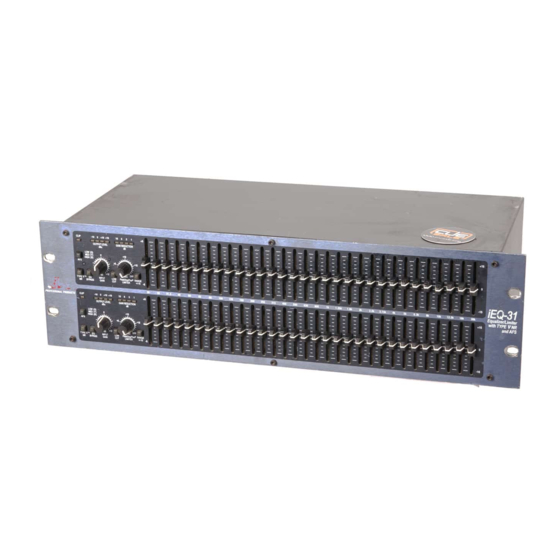dbx iEQ-15 Manuel de l'utilisateur - Page 16
Parcourez en ligne ou téléchargez le pdf Manuel de l'utilisateur pour {nom_de_la_catégorie} dbx iEQ-15. dbx iEQ-15 20 pages. Graphic eq
Également pour dbx iEQ-15 : Manuel de l'utilisateur (16 pages), Spécifications (2 pages), Vue d'ensemble (4 pages)

Using the iEQ in AFS 6-Fixed/6-Live Mode
This mode provides 6 Fixed filters and 6 Live filters� This mode is well suited for permanent installations�
Use this mode when you intend to ring out the system before use (using the Fixed filters) to eliminate the
most prevalent feedback frequencies� 6 Live filters can then be utilized for feedback suppression control
during the performance�
12
Technical Information
1. Configure the iEQ for 6-Fixed/6-Live Mode operation within the Power-Up Mode menu as
described in the "Power-Up Modes" section of this manual�
2. Set all controls as follows:
• Both AFS buttons = Off (LEDs off)�
• Both TYPE V™ NR buttons = Engaged (LEDs on)
• Both EQ BYPASS buttons = Disengaged (LEDs off)
• Both INPUT GAIN controls = 0dB
• Both LOW CUT buttons = Engage these buttons (LEDs on) as long as you do not have
a low cut filter engaged in an active crossover, loudspeaker management processor, your
amplifier(s), or powered speakers� If you do have a low cut filter engaged somewhere in the
signal chain, post iEQ, leave these buttons disengaged (LEDs off)�
• Both PeakStopPlus
• Both RANGE +/-15 buttons = Engaged (LEDs on)
NOTE: Whenever amplifiers are powered on, be sure to reduce audio levels at the power
amplifiers when changing the setting of this switch as it may generate an audible transient�
• All EQ Frequency Band sliders = Flat (center detent)
3. For best performance, set the gain structure of the sound system� This is beyond the scope
of this manual, but there is much information about this process in books and on the
internet� This is when you will determine where the iEQ's INPUT GAIN controls need to
be initially set (they may require further adjustment after equalizing the sound system as EQ
changes may change the output gain of the iEQ processor)� This is also when you will set the
PeakStopPlus
LIMITER controls, if using the iEQ for speaker protection� If you are using
®
dedicated limiters, the limiters within a loudspeaker management processor, powered speakers
with built-in limiters, or any limiters post iEQ, set the iEQ's PeakStopPlus
controls to the "OFF" position�
4. Using a reference CD, a known and trusted vocal mic, or a real time analyzer and calibrated
microphone, EQ the sound system to taste�
5. If your gain structure has been properly calibrated, your mixer's master gains should be close to
unity gain (0dB)� Perform a sound check on each microphone and get them as close as possible
to performance level without inducing feedback� If feedback does occur, slightly lower the
channel's gain�
6. Now that all microphones have been made live, bring the mixer's master faders all the way down
(leave all channel faders where you set them in step 5)�
7. Press and release each AFS button until they are both lit yellow�
8. Slowly raise the mixer's master output gains until you have heard and eliminated a few feedback
frequencies (typically around 5dB above unity gain) As each filter is set, the AFS buttons will
flash and the feedback will disappear� Now set your mixer's master gains back to unity gain�
9. If desired, you can now lock out the front panel controls as described in the "Power-Up
Modes" section of this manual� This is typically applicable for permanent installations� Ensure
the amps are off before power cycling the iEQ and locking out the front panel�
This completes the iEQ setup process�
iEQ User Manual
LIMITER controls = OFF
®
iEQ
LIMITER
®
